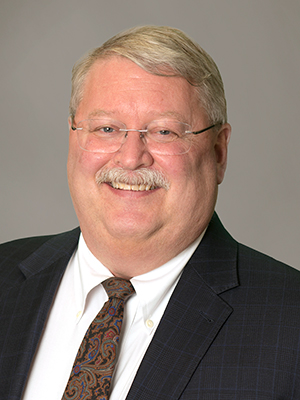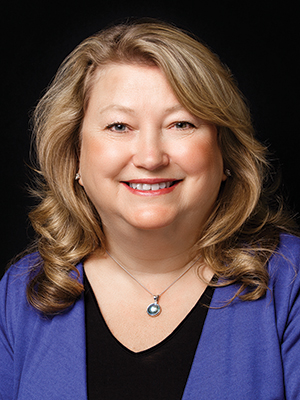Jan. 16, 2019 – Grant Birtch and Kathleen Brost, candidates for State Bar of Wisconsin president-elect post, have a lot in common. Both work in Neenah. Both graduated from U.W. Law School in the 1990s. And both have a lot of solo and/or small-firm experience.
In the next few months, both will also be working to set themselves apart, campaigning to fill a leadership post with a one-year term that precedes a one-year term as State Bar president, starting July 1, 2020. In this article, learn more about the candidates.
State Bar election ballots will be sent to members by April 12, and must be returned by April 26. Winning candidates will begin their respective terms on July 1, 2019. Watch for a Q&A with the president-elect candidates in the March 6 edition of InsideTrack.
Jump to the candidates below:
Grant Birtch
 To say that Grant Birtch knows the State Bar of Wisconsin is an understatement. While serving as president of the Winnebego County Bar Association in 1999, Birtch became active in State Bar activities to amplify his local bar’s voice. And he never stopped.
To say that Grant Birtch knows the State Bar of Wisconsin is an understatement. While serving as president of the Winnebego County Bar Association in 1999, Birtch became active in State Bar activities to amplify his local bar’s voice. And he never stopped.
From the State Bar’s Local Bar Relations Committee to the Leadership Development Committee, from the Finance and Executive committees to the State Bar’s Board of Governors, Birtch has served as a conduit between constituents and the State Bar.
“I think I have a unique perspective,” said Birtch, a business attorney who recently joined the Neenah office of von Briesen & Roper S.C. “I have worked with the current bar leadership and I think they are working hard to provide value to the membership. At the same time, we need to make sure we are empowered to make strategic decisions.”
If elected president-elect, Birtch would have no set agenda, no major initiatives to pursue. He would use his president-elect year to listen to members and try to understand how the State Bar can help them with the resources that are available.
“A lot of young attorneys are hanging out their own shingle,” Birtch said. “We need to make sure the local bars and State Bar are there to support them, to help them be good attorneys in practice. The bar has an obligation to promote the quality practice of law.”
Birtch notes that the information age has provided opportunities for legal services, but also alternatives. He says the State Bar can help the public understand the value of an attorney. “There is no substitute for the attorney-client relationship,” Birtch said.
“We need to have a good approach to ensure the public is aware of the value of our services and the information and advice we can provide beyond LegalZoom,” said Birtch. “That’s just one example of how the association can help individual attorneys.”
Birtch understands the struggles of solo and small-firm lawyers, which comprise a large portion of the State Bar membership. He and his partner Jeffrey Hesson ran the small law firm of Hesson & Birtch LLC for 20 years before joining von Briesen recently.
Wisconsin Transplant
As a lad, Birtch grew up in Boston. His father was a surgeon who specialized in transplantations and helped pioneer live and kidney transplants in the 1960s.
Birtch’s father moved the family to Springfield, Illinois, when Birtch was a teenager, to help start Southern Illinois University School of Medicine. Birtch ended up at Beloit College and majored in psychology. He didn’t have much desire to be a physician.
“I didn’t want to live in my father’s shadow,” said Birtch, who thought about a career in higher education but decided to become a lawyer.
He and his wife Susan ultimately moved to Chicago, where Birtch worked as a paralegal at Mayer Brown, a large law firm with offices throughout the country and the world. Birtch spent three years immersed in major litigation projects before law school.
In the late 1980s, Birtch attended U.W. Law School, graduating in 1990. During law school he served as a judicial intern for Wisconsin Supreme Court Justice William G. Callow (middle name Grant), writing summaries of cases for the justices to review.
Other Officer Candidates
For more information on the 2019 State Bar elections, visit the Elections Page.
Treasurer
Judicial Council
When he graduated, Birtch encountered a tough job market. His first child on the way, Birtch eyed the Fox Valley as a potential landing spot, and it worked out. He landed a litigation associate position with Adams & Woodrow, doing primarily civil litigation. Five years there and three years at another firm, and Birtch was ready for a change.
He caught on with Hesson, who was a solo practitioner at the time. “His one rule was that I had to stop suing people,” said Birtch, who transitioned from primarily family law litigation to a transactional practice in business law, estate planning, and other areas.
“Family law is a tough area of practice. Emotions run high. I moved to a kinder and gentler practice,” said Birtch, noting that a transactional practice opened other doors.
Birtch has volunteered his time in various roles for the State Bar, as well as his community, for the last 20 years. For the last eight years, Birtch served as chair of the State Bar’s Audit Committee, which coordinates and monitors auditing activity.
He also served as president of the boards of the Neenah-Menasha YMCA and the Christine Ann Domestic Abuse Shelter in Oshkosh. Now he’s ready for another role.
“I am passionate about the things I do and the things I believe in, and the State Bar is part of that,” said Birtch, who represented Winnebago, Fond du Lac and Green Lake counties while on the State Bar Board of Governors from 2003 to 2007.
“It’s my opportunity to be a conduit for attorneys statewide,” said Birtch. “I’ve seen both the service side and the governance side of the State Bar, as well as the financial side, so I think I have a unique perspective. I’d be honored to help lead the organization.”
Birtch and his wife Susan have three adult children (one of them a new lawyer in Milwaukee). He’s an alpine skier and a black-belt martial artist.
Learn more about Grant Birtch.
Kathleen Brost
 You might say Kathy Brost is a champion for solo and small firms. Brost is heavily involved in the State Bar of Wisconsin’s annual Solo & Small Firm Conference (WSSFC), and she’s on the board of the Solo Small Firm & General Practice Section.
You might say Kathy Brost is a champion for solo and small firms. Brost is heavily involved in the State Bar of Wisconsin’s annual Solo & Small Firm Conference (WSSFC), and she’s on the board of the Solo Small Firm & General Practice Section.
There’s a good reason. Brost, now a trust officer at the Legacy Private Trust Company in Neenah, leaned on these resources when she started a solo practice in 2004.
“I started from scratch,” Brost said. “I had no clue how to run a law practice. I started going to the solo and small firm conference to get technology and practice management tips. I learned so much about what I didn’t know, and I kept going back, year after year.”
Over 15 years, Brost built a thriving solo law practice, counseling clients nationwide – mostly fraternal benefit societies – on tax and insurance-related issues. She also encountered many of the same challenges that solo and small-firm lawyers do.
Now, she’d like to help solo and small-firm lawyers – and the rest of the State Bar membership – by using her experience and knowledge to lead as president. If elected, Brost would serve as a liaison between the members and the organization.
She would use her president-elect year to understand the resources that State Bar members need to run their practices. “Running a law practice is a challenge in and of itself,” Brost said. “I want to understand those challenges and provide real solutions.”
More specifically, Brost said that if the $40 rate paid to private bar attorneys to take public defender cases is not raised by 2020, she would make that a priority. Brost would also like to provide more resources on succession planning, to help retiring lawyers, to explore why women leave law firms, and how lawyers can harness today’s technology.
“The State Bar does a lot of good things,” Brost said. “The challenge is figuring out how to allocate the resources to support attorneys while also supporting other strategic priorities of the bar, such as public advocacy and access to justice.”
Neenah Lifer
Brost was born and raised in the Neenah area, and she still lives and works there now. She attended Lakeland College in Sheboygan, majoring in business administration.
She worked her way through college, attending classes at night and on weekends while she worked at Marine Bank. When she graduated from college, she was nine months pregnant. She took time off after graduating, and started thinking about law school.
“I took the LSAT on a whim and remember telling my husband Bob, ‘if they accept me, I’ll go,” said Brost, who was accepted to and attended U.W. Law School.
Brost commuted two hours each way, three to four days per week, and finished law school in 2.5 years, graduating in 1992. Back then, like now, the job market was tight.
Brost landed at the Aid Association for Lutherans, which merged into Thrivent Financial. She started as a tax advisor and then moved up to in-house counsel, obtaining numerous certifications in financial planning, securities, investing, and insurance.
Brost departed in 2004 to start her own law practice. Small companies began hiring her as outside counsel to provide advice on financial and insurance product compliance, risk management, corporate governance issues, and other issues in the financial sector. Brost was an expert in those areas, but now she had her own business to run.
“I really do understand the challenges that lawyers are facing, because I literally started from scratch,” Brost said. “I was spending about three hours of every day on administrative tasks, nonbillables work, and wondering if I was doing something wrong.”
In her conversations with other solo and small-firm lawyers, Brost realized she wasn’t alone. She started using State Bar resources to improve efficiencies and learn how she could implement technology for a virtual practice dependent on her laptop computer.
Eventually, Brost began serving on the WSSFC’s planning committee (chair in 2012), and continues to serve on the planning committee to help bring dynamic and valuable resources to solo and small-firm lawyers who may struggle to build the business.
Brost has also served on the Solo Small Firm and General Practice Section board since 2010 – chair between 2015 and 2017 – and has worked on projects like the State Bar’s Business School for Lawyers and the Challenges Facing New Lawyers Task Force.
Currently, she’s also on the State Bar’s Board of Governors, representing District 3 (Fond du Lac, Green Lake, and Winnebego counties), and wants to take the next step.
“I’ve worked to help the State Bar realize and understand what lawyers need, what kind of support they need, and what kind of resources they need,” Brost said.
“Smaller firms with fewer than five attorneys often need the most help, and a large percentage of lawyers in Wisconsin are in those smaller firms. I recognize the issues are always changing, and I welcome an opportunity to lead and support the members.”
Brost has two adult children and enjoys gardening. A former aspiring artist, Brost finds time to do art projects with friends, and she and her husband Bob are avid travelers.
Learn more about Kathleen Brost.
